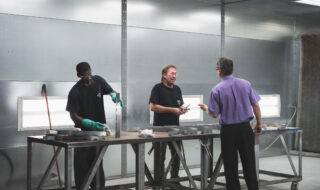February 2, 2022
NFIB Opposes Three Anti-Small Business Initiatives by the National Labor Relations Board
The National Labor Relations Board (NLRB) has indicated that it intends to advance a series of demands made by labor unions. In three separate cases, the NLRB is examining and may overturn decisions made by the previous administration. The NFIB Small Business Legal Center argues that these three cases each have the potential to open the door to more employee misclassification claims, unionization, and intrusive anti-small business regulation.
Thryv Inc. The NLRB General Counsel has alleged that Thryv, a small business management platform, wrongfully terminated six employees without first bargaining with labor union IBEW Local 1269. In similar past cases, the NLRB has ordered companies to reinstate the terminated employees and provide a “make whole” remedy where the employees are given back pay as well as restoration of benefits and seniority rights. However, in this case the NLRB is also considering levying “consequential damages” against Thryv. These are damages that occurred as a direct and foreseeable result of the termination, meaning Thryv would be required to make the wrongfully terminated employees whole not only for lost wages but for other economic damages suffered by those same employees.
In response to an NLRB request for amicus briefs, NFIB joined with the Coalition for a Democratic Workplace (CDW) to argue that the NLRB should retain its traditional practice of reinstating an employee with back pay for lost earnings and benefits, without considering consequential damages. The brief also argues that the National Labor Relations Act does not authorize the NLRB to levy consequential damages.
American Steel Construction. The NLRB also issued a notice inviting briefs in this case, where a union filed a petition seeking to establish a bargaining unit to represent a small unit of field ironworkers. The employer objected to the proposed unit, arguing it was inappropriate because the interests of the represented group were not distinct from other workers in the plant who were not represented by the unit. The NLRB previously allowed for smaller micro-bargaining units, but that standard was successfully overturned with NFIB’s support in 2018.
Once again, NFIB joined with the CDW in an amicus brief, which argued that the NLRB should adhere to its current precedents, which disqualify this smaller bargaining unit.
The Atlanta Opera, Inc. A group of makeup artists and hairstylists contracted by the Atlanta Opera attempted to form a union, to which the Atlanta Opera argued that as independent contractors they are not entitled to unionize. The case hinges on whether the group of employees are independent contractors, and the NLRB is considering reimposing more stringent independent contractor standards issued by the Obama Administration’s NLRB and later overturned by the Trump Administration’s NLRB.
On February 10, NFIB will join a brief in the case arguing that the more stringent Obama-era standard damages employers in a wide variety of industries, such as franchisors that classify their franchisees as independent contractors as well as subcontractors.
The NFIB Small Business Legal Center acts as the voice for small business in the nation’s courts and the legal resource for small business owners nationwide. Learn more here.
NFIB is a member-driven organization advocating on behalf of small and independent businesses nationwide.
Related Articles














